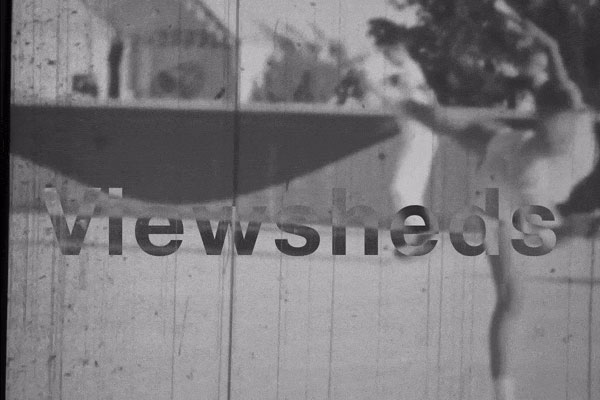Time and Place
Location: Jim Shields Gallery of Architecture & Urbanism sponsored by HGA (AUP146) – UWM Campus – 2131 E Hartford Ave, Milwaukee, WI 53211
Time: All Day
Summary:
Viewsheds will assemble a collective panoramic of the “American” landscape, constructed through the diverse gazes and perspectives of invited practitioners and academics from around North America. As the field explores alternatives and radical reconfigurations to the Western landscape of modernity, Viewsheds will host a series of dialogues that engage the role of representation and aesthetics in our collective responses to ecological change. We borrow here from Brian Larkin’s use of aesthetics: a “sensing of modernity, a process by which the body, as much as the mind, apprehends what it is to be modern, mutable, and progressive.” In a world composed of images, what are the ways in which the design fields, the very fields who specialize in composing worlds through images, are re-configuring, re-presenting, or even re-producing this sensing? Bringing together architects, landscape architects, theorists, activists/organizers, artists, and students across a series of panels, dinners, workshops, and screenings hosted by the University of Wisconsin Milwaukee’s School of Architecture and Urban Planning, Viewsheds will be presented in conjunction with the Site Unseen exhibition and the “territorial” scale studio in SARUP’s new core studio sequence, framing the importance of new, speculative aesthetics within emerging pedagogies and practices, particularly as architecture schools around North America increasingly contend with the climate crisis within their curricula.
Schedule
All events in first floor gallery space at SARUP, all times CST.
Wednesday 4/17/24
4:00 – 6:00 – Film Screening – Mike Gibisser and Ben Balcom
6:00 – 6:15 – Dance Performance – Dan Schuchart
6:15 – 7:00 – Student Panel – Film and Architecture – Sam Drake, Gillian Waldo, Bennett Westling
Thursday 4/18/24
1:30 – 1:45 – Opening Remarks – Dean Mo Zell
1:45 – 4:00 – Panel 1
Brian Davis – Natural Infrastructure Lab, UVA and Proof
Abra Lee – Conquer the Soil
Ben Balcom – University of Wisconsin Milwaukee
Dept – Isaac Stein and Maggie Tsang
4:30 – 6:45 – Panel 2
Neyran Turan – University of California Berkeley
Oficina de Resiliencia y Urbana – Adriana Chavez and Victor Rico
Tepetl Paisaje – Roberto Ransom Ruiz
Mike Gibisser – University of Wisconsin Milwaukee
6:45 – 7:15 – Closing Panel and Remarks with all invited guests
7:15 – 7:30 – Reception
Invited speakers include:
DEPT, Maggie Tsang, Houston
Maggie Tsang is an architect and urbanist whose research focuses on the intersection between landscape, urbanism, and infrastructure. She is cofounder and managing principal of Dept., a landscape architecture and urban design studio based in Houston. Dept.’s current work spans various scales, from an experimental garden and constructed prairie at Rice University to a two-acre public park with Buffalo Bayou Partnership in Houston’s East End. Dept.’s recent Good Neighbor Stormwater Park, a community retention basin in North Miami, won Fast Company’s Best of Urban Design Award in 2020 and the Florida Gold APA Award for Innovative Design. Dept. was also recently awarded the 2022 League Prize from the Architectural League of New York.
Brian Davis, Natural Infrastructures Lab, UVA
Brian Davis, PLA, FAAR is an Associate Professor in the Landscape Architecture Department at the University of Virginia School of Architecture. His work focuses on coastal landscape form, with a special interest in infrastructure, public space, and ecology. This interest in landscape form is anchored by the realization that it can be both indicative of past processes and values as well as future performance. His work is driven by the contemporary interest in design methods as a form of inquiry, rather than as mere problem-solving or the application of principles or knowledge generated by other means. This insight translates to his teaching, which emphasizes invention, the ability to synthesize among unlike things, and to contextualize facts and ideas. He has published theoretical and technical papers and book chapters, including “Public Sediment” in Towards an Urban Ecology, “Wider Horizons of American Landscape” in Landscape Journal, and “The Asymmetry of Landscape” in Journal of Landscape Architecture.
Oficina de Resiliencia Urbana, Adriana Chavez, Mexico City
Adriana Chavez is an Adjunct Assistant Professor who holds a master’s degree from Harvard Graduate School of Design (GSD) in Urbanism, Landscape and Ecology and a Master in Architecture II. She graduated in 2014 and was recipient of the Urban Project Prize. She is the co-founder of ORU, Office for Urban Resilience, a design think tank that focuses on implementing innovative solutions for cities through urban design and landscape infrastructure with a water sensitive approach. She holds a bachelor’s degree in Architecture from Universidad Iberoamericana in Mexico City where she graduated with honors in 2008. Her experience ranges within the public, private and development banks sectors. She has been a consultant for the Interamerican Development Bank (IDB) at the Urban Development and Housing (HUD) within the Emergent and Sustainable Cities Program in Mexico. She has also worked as an urban resilience advisor for Mexico City’s Resilience Office within the initiative 100 Resilient Cities pioneered by the Rockefeller Foundation. She collaborated closely to the CDMX Chief Resilience Officer Arnoldo Matus, participating on the creation of Mexico City’s Resilience Strategy, leading urban planning and mobility areas. Within the resilience office, she contributed largely to build the urban resilience agenda in the city, contributing in projects such as “Towards a Water Sensitive Mexico City” in collaboration with CDMX Public Space Authority, De Urbanisten and Deltares. Adriana has also been an advisor for the Santiago Regional Government carrying out the Santiago’s Resilience Strategy.
Tepetl, Roberto Ransom, Mexico City
Roberto Ransom Ruiz is the principal of Tepetl Paisaje, based in Mexico City. His work focuses on community-based and localized approaches to our ecological landscapes and ranges from re-wilding proposals for urban plots to remediation and infiltration strategies for land conservation. Ransom earned his Master’s in Landscape Architecture from Harvard’s Graduate School of Design, where he was a researcher at the Critical Landscapes Lab and the Mexican Cities Initiative. He holds an architecture degree from Tecnológico de Monterrey. He has received grants from the National Council of Science and Technology (CONACYT), and UCLA in collaboration with MIT’s Urban Risk Lab, among others. In 2016, Roberto’s team won Arquine’s top prize for the Mextropoli Pavilion. Roberto worked at MVVA on projects in Boston, Toronto, and Riyhad, involving abandoned piers, river rewilding, and decommissioned airports, ranging from 3 to 300 acres. At JSa – Taller de Arquitectura, he worked with Snøhetta designing the Museum of Environmental Sciences (Guadalajara), which has set a benchmark for similar projects. He has experience working with rural and urban communities across the U.S., Canada, and Mexico, enriching his decade-long design experience with fieldwork and research. Throughout his career, Roberto has focused on nature-based, process-driven master planning, blending environmental science and ethnography for nuanced designs.
In addition to these speakers, the symposium will host performances by the UWM Dance Department, dinners hosted through local restaurants, and panels featuring local practitioners in landscape and architecture.
BIO
Andy Lee is the current Teaching Fellow at SARUP and the current Charles Eliot Traveling Fellow at the Harvard Graduate School of Design. His research explores, through film, the slippage between sight and site at the core of the western landscape construction, and the ways in which landscape form is operationalized as image by the US developmentalist apparatus. Andy has worked at Michael Van Valkenburgh Associates in Brooklyn, the United Nations Development Programme in Dhaka, and Leupold Brown Goldbach Architekten in Munich. He holds a Master of Landscape Architecture and a Master of Urban Planning from the Harvard Graduate School of Design, and a Bachelor of Science in Architecture from Washington University in St. Louis. His work has been published in the Journal for Architectural Education and Landscape Architecture Magazine, and he has presented with the Museum of Modern Art, the Icelandic University for the Arts, and the European Architectural History Network. He is the recipient of the American Society of Landscape Architects Honor Award for his project, “Retreat Yourself,” on the role of property rights in coastal Massachusetts under chronic sea-level rise.
Questions, comments?
All lectures are free and open to planners, students, staff, faculty, and friends of the University. For more information contact Architecture Chair Karl Wallick.



